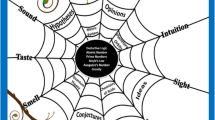Abstract
Diagnostic errors are more frequently a result of the clinician's failure to combine medical knowledge adequately than of data inaccuracy. Diagnostic reasoning studies are valuable to understand and improve diagnostic reasoning. However, most diagnostic reasoning studies are characterized by some limitations which make these studies seem more simple than diagnostic reasoning in real life situations actually is. These limitations are connected both to the failure to acknowledge components of knowledge used in clinical practice as well as to acknowledge the physician-patient relationship's influence on clinical knowledge and on the reasoning process itself. In addition the modes of reasoning described in these studies frequently is oversimplified. In this paper three simplistic and competing models of diagnostic reasoning are analyzed and criticized, followed by an evaluation of two alternative models proposing a combined view.
Similar content being viewed by others
REFERENCES
Mabeck CE, Kragstrup J. Is variation a quality in general practice? Scand J Prim Health Care 1993; 11Suppl 1: 32-5.
Eddy DM: Variations in physician practice: The role of uncertainty. In Dowie J and Elstein A, eds. Professional judgment. A reader in clinical decision making. Cambridge: Cambridge Univ Press, 1988: 45-59.
Kalf AJH, Spruijt-Metz D. Variation in diagnoses: Influence of specialists' training on selecting and ranking relevant infomation in geriatric case vignettes. Soc Sci Med 1996; 42: 705-12.
Koren LM. The reliability of clinical methods, data and judgments. NEJM 1975; Okt 2.: 695-701.
Ridderikhoff J. Problem-solving in general practice. Theor Med 1993; 14: 343-63.
Schøn DA. The reflective practitioner. How professionals think in action. Cambridge: Basic Books, 1983.
Timka T, Arborelius E. The GP's dilemmas: A study of knowledge need and use during health care consultations. Meth Inform Med 1990; 29: 23-9.
Hobus PPM, Schmidt HG, Boshuizen HPA, Patel VL. Contextual factors in the activation of first diagnostic hypothese: Expert-novice differences. Med Ed 1987; 21: 471-6.
Førde R, Malterud K. Components of clinical knowledge which indicate need for intervention in pregnancy. Scand J Prim Health Care 1992; 10: 272-6.
Hughes D. Everyday and medical knowledge in categorizing patients. In Dingwell R, Heath C, Reid M and Stacey M, eds. Health care and health knowledge. London: Croom Helm Ltd, 1977: 127-40.
Barrows HS, Tamblyn RM. Problem-based learning. An approach to medical education. NY: Springer Publ Comp, 1980.
Friedman HS. Nonverbal communication between patients and medical practitioners. J Soc Issues 1979; 35: 82-99.
Bugental DE, Kaswan JW, Love LR. Perception of contradictory meanings conveyed by verbal and nonverbal channels. J Pers Soc Psych 1970; 16: 647-55.
Helman CG. Culture, health and illness. Oxford: Butterworth-Heinemann Ltd, 1993.
Siegman AW. Paraverbal correlates of stress: Implications for stress identification and management. In Goldberger L and Breznitz S., eds. Handbook of stress. Theoretical and clinical aspects. NY: The Free Press, 1993: 274-99.
Stein HF. The psychodynamics of medical practice. Unconscious factors in patient care. Berkely/Los Angeles/London: University of California Press, 1985.
Zinn WM. Doctors have feelings too. JAMA 1988; 259: 3296-8.
Sober E. The art and science of clinical judgment: An informational approach. In Engelhardt HT, Spicker SF, Towers B., eds. Clinical judgment: A critical appraisal. Dordrecht/Boston/London: Reidel Publishing Comp, 1979: 29-44.
Hornby AS. Oxford advanced learner's dictionary of current English. London: Oxford Univ Press, 1974.
Måseide P. Analytical aspects of clinical reasoning: A discussion of models for medical problem solving. Social organization of doctor-patient communication. In Fisher S and Todd AD, eds. Doctor-patient communication. Wash: The Center for Applied Linguistics, 1983: 241-65.
Vanderpool HY, Weiss GB. Patient truthfulness: A test of models of the physician-patient relationship. J Med Phil 1984; 9: 353-72.
Eisenberg JM. Sociologic influences on decision-making by clinicians. Ann Int Med 1979; 90: 957-64.
Quill TE. Recognizing and adjusting to barriers in doctor-patient communication. Ann Int Med 1989; 11: 51-7.
Elstein AS, Shulman LS, Sprafka SA. Medical problem solving. An analysis of clinical reasoning. Cambridge and London: Harvard Univ Press, 1978.
Clark JA, Potter DA, McKinlay JB. Bringing social structure back into clinical decision making. Soc Sci Med 1991; 32: 853-66.
Shiber A, Maoz B, Antonovsky Aa, Antonovsky H. Detection of emotional problems in the primary care clinic. Fam Pract 1990; 7: 195-200.
Barrows HS, Feltoviz PJ. The clinical reasoning process. Med Educ 1987; 21: 86-91.
McGuire CH. Medical problem-solving: A critique of the literature. J Med Educ 1985; 60: 587-95.
Barosi G, Magnani L, Stefanelli M. Medical diagnostic reasoning: Epistemological modeling as a strategy for design of computer-based consultation programs. Theor Med 1993; 14: 43-55.
Ridderikhoff J. Medical problem-solving: An exploration of strategies. Med Educ 1991; 25: 196-207.
Ridderikhoff J. Methods in medicine. A descriptive study of physicians' behaviour. Dordrecht/Boston/London: Kluwer Academic Publishers, 1989.
Sacket DL, Haynes RB, Tugwell P. Clinical epidemiology. A basic science for clinical medicine. Boston/Toronto: Little, Brown and Company, 1985.
Groen GJ, Patel VL. Medical problem-solving: some questionable assumptions. Med Educ 1985; 19: 95-100.
Barrows HS, Norman GR, Neufeld VR, Feightner JW. The clinical reasoning of randomly selected physicians in general medical practice. Clinical & Investigative Med 1982; 5: 49-55.
Hamm RM. Clinical intuition and clinical analysis: expertise and the cognitive continuum. In Dowie J and Elstein A, eds. Professional judgment. A reader in clinical decision making. Cambridge: Cambridge Univ Press, 1988: 78-105.
Rabinowitz S, Herz M, Granek M, Lehmann S, Pincus C, Maoz B. The doctor and his feelings: A course for residents in family medicine. Fam Pract 1989; 6: 199-202.
Waitzkin H. Doctor-patient communication. Clinical implications of social scientific research. JAMA 1984; 252: 2441-6.
Wassermann RC. Systematic analysis of clincian-patient interactions: A critique of recent approaches with suggestions for future research. Med Care 1983; 11: 279-93.
Balla JI. Logical thinking and the diagnostic process. Meth Inform Med 1980; 19: 88-92.
Maguire P. Can communication skills be taught? Br J Hosp Med 1990; 43: 215-6.
Author information
Authors and Affiliations
Rights and permissions
About this article
Cite this article
Førde, R. Competing Conceptions of Diagnostic Reasoning – Is There a Way Out?. Theor Med Bioeth 19, 59–72 (1998). https://doi.org/10.1023/A:1009978315185
Issue Date:
DOI: https://doi.org/10.1023/A:1009978315185




